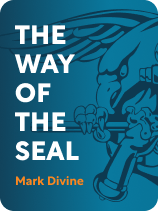

This article is an excerpt from the Shortform book guide to "The Way of the SEAL" by Mark Divine. Shortform has the world's best summaries and analyses of books you should be reading.
Like this article? Sign up for a free trial here.
Why is it so hard to adapt to change in business? What are the key strategies to successfully leading a company that is going through a transition?
Most people oppose change in businesses, but often it’s inevitable. To prepare for this, Mark Divine’s book The Way of the SEAL says you need to embrace change and be open to adapting to it so that your team is ready for anything.
Take a look at how adapting to change in business impacts your role as a leader.
Embrace and Adapt to Change
Divine says that to successfully lead in a VUCA world (volatile, uncertain, complex, ambiguous), business leaders must stay one step ahead of their competitors. Adapting to change in business is the best way to do this, along with being confident and letting go of things that don’t work.
(Shortform note: In addition to the VUCA element defining the work world, experts say that the landscape that business leaders currently confront is undergoing three-dimensional change. In other words, it’s occurring: 1) all the time, 2) in multiple areas of life, and 3) exponentially. So, change that used to occur over years and decades now happens in weeks or days.)
1. Act Quickly and Proactively to Change
Divine says that to thrive as a leader in an ever-evolving landscape, you have to be proactive, not reactive, to be aware of developments on the horizon that could compromise or enhance your work. To do this:
1. Act quickly and decisively. When you act fast in the face of change, you don’t get hung up on things that aren’t working. This also allows you and your team to identify and take advantage of cutting-edge opportunities.
To act quickly and decisively, foster trust with your team and set up standard operating procedures. Building trust encourages healthy risk-taking, problem-solving, and innovation. Standardizing routine parts of work life—like office communication protocols and regular planning meetings―streamlines operations so your team can act fast and confidently tackle new challenges as they arise.
(Shortform note: Ironically, some say that the way to speed up and improve your actions is to slow down. In Blink, Malcolm Gladwell argues that you can hasten and strengthen your instinctive decision-making by slowing down and training your unconscious mind deliberately—because even snap judgments take time. To do this, practice reading people’s micro facial expressions, which occur in a fraction of a second and show what a person really thinks and feels. This allows you to gather intel then make more precise snap judgments about their personality and how they’re likely to act. The more you attune yourself to split-second expressions, the better and faster you can read people and make accurate decisions.)
2. Be on the lookout for threats and opportunities. When you’re perpetually attuned to what’s going on around you, you’re less likely to get caught off guard, more aware of opportunities you can take advantage of, and better prepared to predict your competition’s next move—which will help you stay ahead of them and lead successfully.
(Shortform note: In The 10X Rule, Grant Cardone argues that to stay ahead of and beat your rivals you should focus on dominating, not just competing against them. When you’re in a merely competitive mindset, you can waste time observing your rivals and trying to compete at their level. But when you focus on identifying things your rivals can’t or won’t do and outworking them, you can dominate them and win.)
To practice attuning yourself to your surroundings, consistently pay attention to what’s going on around you when you’re in public spaces. For example, when you’re at the grocery store, scan the room and take note of things that seem out of the ordinary. Are most people moving quickly or slowly? Does anyone stand out for rushing?
Divine recommends that you regularly practice this skill in every space until this heightened state of awareness becomes part of you, then apply it to your business. For example, look at the market around you: Are your competitors doing things differently from normal? Can their actions negatively impact your work or open opportunities for a new path forward?
(Shortform note: Being attuned to your surroundings is a good strategy to help you adapt quickly. But be mindful of ways that internal biases can lead you to identify things that “stand out” that shouldn’t. America’s post-9/11, “See something, say something” call to action contributed to hyper-surveillance of Black and brown communities based on suspicions and fears—with no meaningful reduction in crime. As a result, the Black Lives Matter movement transformed the phrase to call on communities to look out for one another instead of trying to help police by reporting their neighbors based on ill-formed suspicions.)
2. Be Confident by Changing Your Language
Divine says that building your confidence will help you more effectively navigate a rapidly changing work world and be a stronger, more successful leader. To do this, regularly pay attention to your language and choose positive, active words instead of words that conjure up images and feelings of weakness and uncertainty—which undermines your confidence and others’ confidence in you.
For example, don’t say you’ll “try” to do something, which conveys doubt. Instead, say that you’ll “definitely achieve results.” This instills confidence that you’ll succeed. Practice this regularly to build sustained feelings of confidence and inspire others’ confidence in you. (Shortform note: In The Confidence Code, Katty Kay and Claire Shipman argue that confidence results from biological and environmental factors, and that 50% of it may result from choice and will, like Divine’s advice to choose empowering words. To build confidence, Kay and Shipman advise focusing on how your actions will benefit others instead of focusing on yourself; also, take credit for your accomplishments instead of downplaying them.)
3. Let Go of What Doesn’t Work
Divine says that in a VUCA work world, leaders can’t waste time on outdated ideas, plans, or products and services. The moment you realize a plan isn’t working, take a calculated risk and shift to a different plan—even if it’s not fully formulated. If your plan fails, view that failure as a chance to learn. Then, wipe the slate clean early and often to build confidence in your ability to meet new challenges, move forward and innovate more quickly, and outwit competitors who fail to do the same.
(Shortform note: In Factfulness, Hans Rosling counters that you should get all the facts before you act, because your sense of urgency is often alarmist and can lead you to make panicked decisions that do more harm than good. We often lean into impulsive decisions because salespeople and activists actively exploit our urgency instinct. As a result, we fear we’ll miss out on opportunities if we don’t act fast. In most cases, however, you have to carefully analyze all the information in front of you to ensure a good outcome.)
To get comfortable shifting gears without a perfect plan:
- Try something different from what you’d normally do.
- If you fail, think about how to apply what you’ve learned from that experience to your next attempt.
- Try again, implementing changes from lessons you’ve learned.
- Repeat this process until you succeed.
(Shortform note: In The Art of the Deal, Donald J. Trump counters that you should always have a backup plan B, C, and D—and that you shouldn’t get overly attached to any of them. Most deals don’t pan out, so when things fall apart you have to pivot quickly and not waste time putting together a new plan on the spot. To develop strong backup plans, aim high so you don’t limit yourself, focus on what your target audience wants and how they think, and prepare for the worst so that even if things fall through, you’re ready to go again.)

———End of Preview———
Like what you just read? Read the rest of the world's best book summary and analysis of Mark Divine's "The Way of the SEAL" at Shortform.
Here's what you'll find in our full The Way of the SEAL summary:
- A former Navy SEAL's strategies to help business leaders
- A mind-body technique that combines yoga, martial arts, and SEAL training
- How to bolster and harness your mental fortitude






